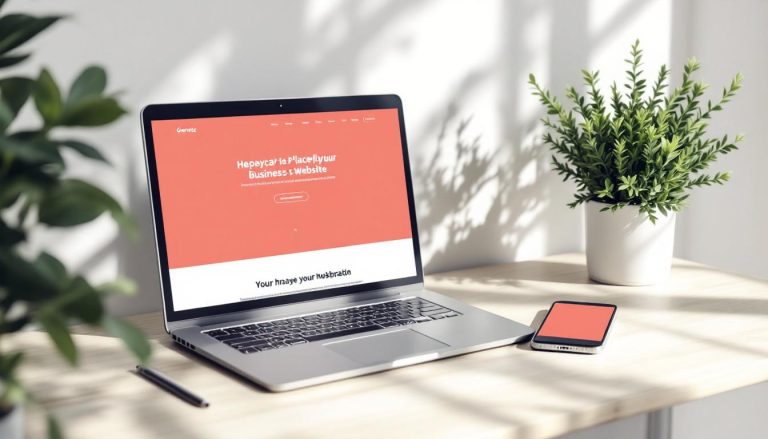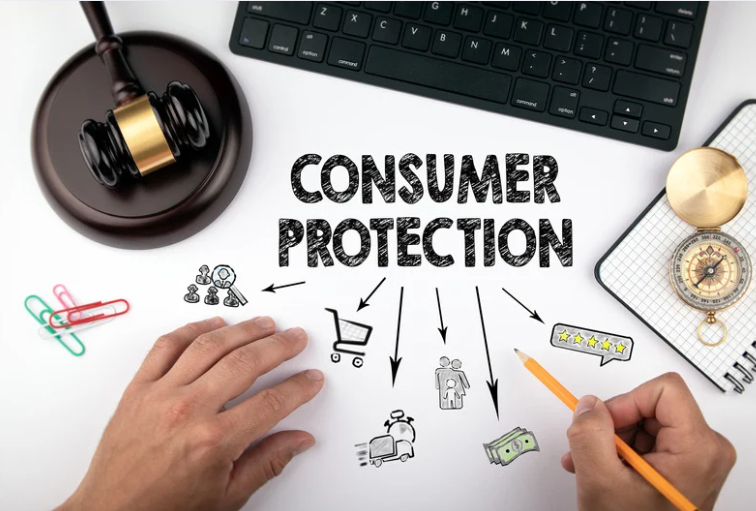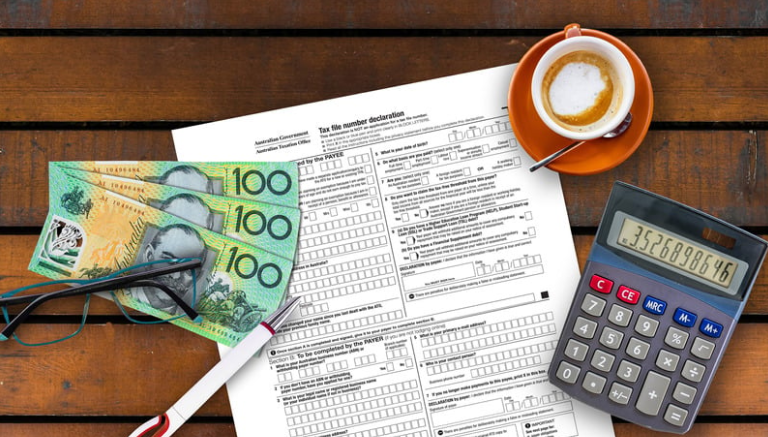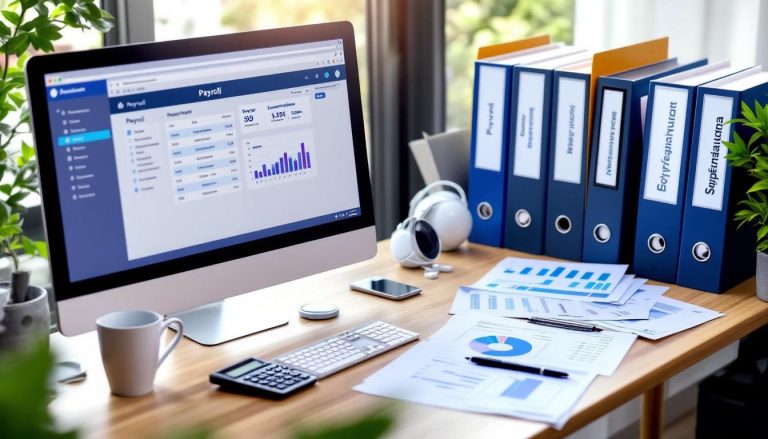Starting a small business in Australia? You’ll need to navigate the world of business licences and permits.
At SmallBizToolbox, we know this process can be overwhelming. That’s why we’ve created this guide to help you understand what licenses and permits you need for your Australian small business.
From federal requirements to local council approvals, we’ll cover everything you need to know to stay compliant and set your business up for success.
What Are Business Licenses and Permits?
Definition and Purpose
Business licenses and permits in Australia are official documents that give you legal permission to operate your small business. These papers ensure you follow regulations and standards set by various levels of government.
Federal, State, and Local Requirements
At the federal level, all Australian businesses need an Australian Business Number (ABN). This unique 11-digit identifier is essential for tax purposes and business transactions. It’s free to register for an ABN through the Australian Government’s Business Registration Service.
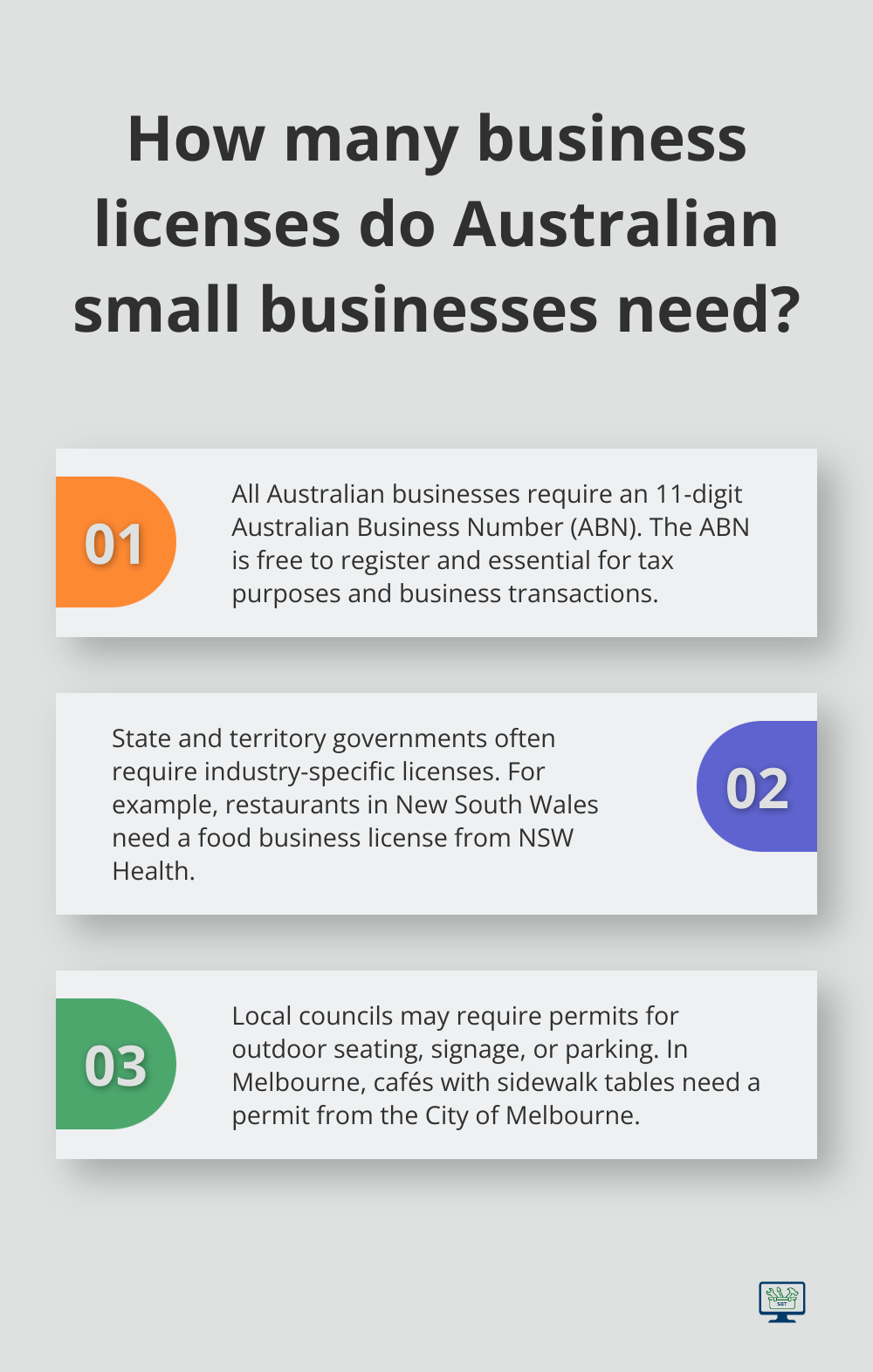
State and territory governments often require industry-specific licenses. For example, if you run a restaurant in New South Wales, you’ll need a food business license from NSW Health. To obtain this license, you need to submit an application form, pay a one-off application fee and first annual licence fee, and be ready to meet relevant food standards.
Local councils also play a role in business licensing. They might require permits for things like outdoor seating, signage, or parking. For instance, if you plan to open a café in Melbourne with sidewalk tables, you’ll need a permit from the City of Melbourne.
The Importance of Compliance
Ignoring these requirements can lead to hefty fines or even forced closure of your business. In 2022, the Australian Securities and Investments Commission (ASIC) reported over 3,000 enforcement actions against non-compliant businesses, resulting in millions of dollars in penalties.
Compliance isn’t just about avoiding fines. It’s about building trust with your customers and partners. A properly licensed business demonstrates professionalism and commitment to quality standards.
Navigating the Licensing Process
The Australian Business Licence and Information Service (ABLIS) is an excellent starting point for identifying which licenses you need. This free online tool asks you questions about your business and provides a tailored list of required licenses and permits.
Licensing requirements can change. It’s wise to set up a system to review your licenses annually. This proactive approach will help you stay compliant and avoid surprises down the road.
Understanding and obtaining the right licenses and permits lays a solid foundation for your small business in Australia. It’s not just about ticking boxes – it’s about setting yourself up for long-term success in a competitive market.
Now that we’ve covered the basics of business licenses and permits, let’s explore the most common ones you’ll need for your Australian small business.
Essential Licenses and Permits for Your Australian Small Business
The ABN: Your Business Identity
The Australian Business Number (ABN) forms the foundation of your business identity. This unique 11-digit number identifies your business to the government and other entities. Your application for an ABN starts here. Before applying, ensure you’re entitled to an ABN. Not everyone is entitled to an ABN.
Registering Your Business Name
Unless you operate under your personal name, you must register your business name. This registration allows customers to identify and find your business easily. (Note that registering a business name doesn’t give you exclusive rights to that name – for that, you need to register a trademark.)
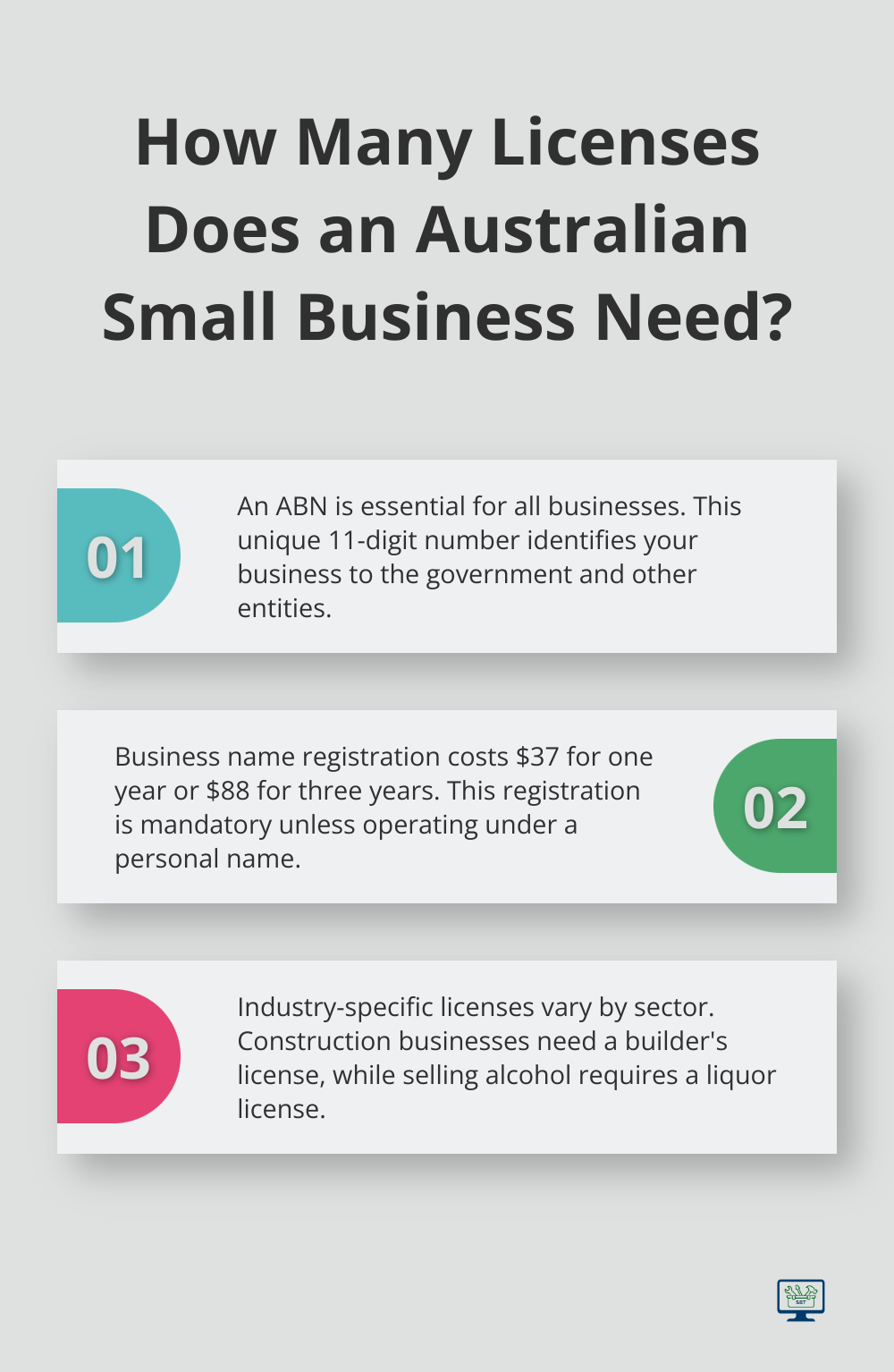
Business name registration costs $37 for one year or $88 for three years. You can complete this process through the Australian Securities and Investments Commission (ASIC) website.
Industry-Specific Licenses: Meeting Standards
Your industry may require specific licenses to operate. Search for licences and permits for your business type on the Australian Business Licence and Information Service.
Those in the construction industry need to obtain a builder’s license. Requirements vary by state but generally include proof of qualifications and experience, as well as financial solvency.
If you plan to sell alcohol, you need a liquor license. These can be more complex to obtain, often requiring community consultation and approval from local authorities.
Local Council Permits: The Final Piece
Don’t overlook local council permits. These often relate to how your business interacts with the local community. For instance, you need permits from your local council to put up signage or have outdoor seating for a café.
These permits ensure that your business operations don’t negatively impact the local area. Costs and processing times vary widely between councils, so check with your local authority early in your planning process.
Now that we’ve covered the essential licenses and permits, let’s explore how to determine and obtain the specific ones you need for your business.
How to Find and Apply for Business Licenses
Leveraging ABLIS for License Identification
The Australian Business Licence and Information Service (ABLIS) serves as an essential tool for determining necessary licenses. This free online service helps you find out which licences you need to start, run and grow your business. ABLIS then generates a tailored report of required licenses and permits.
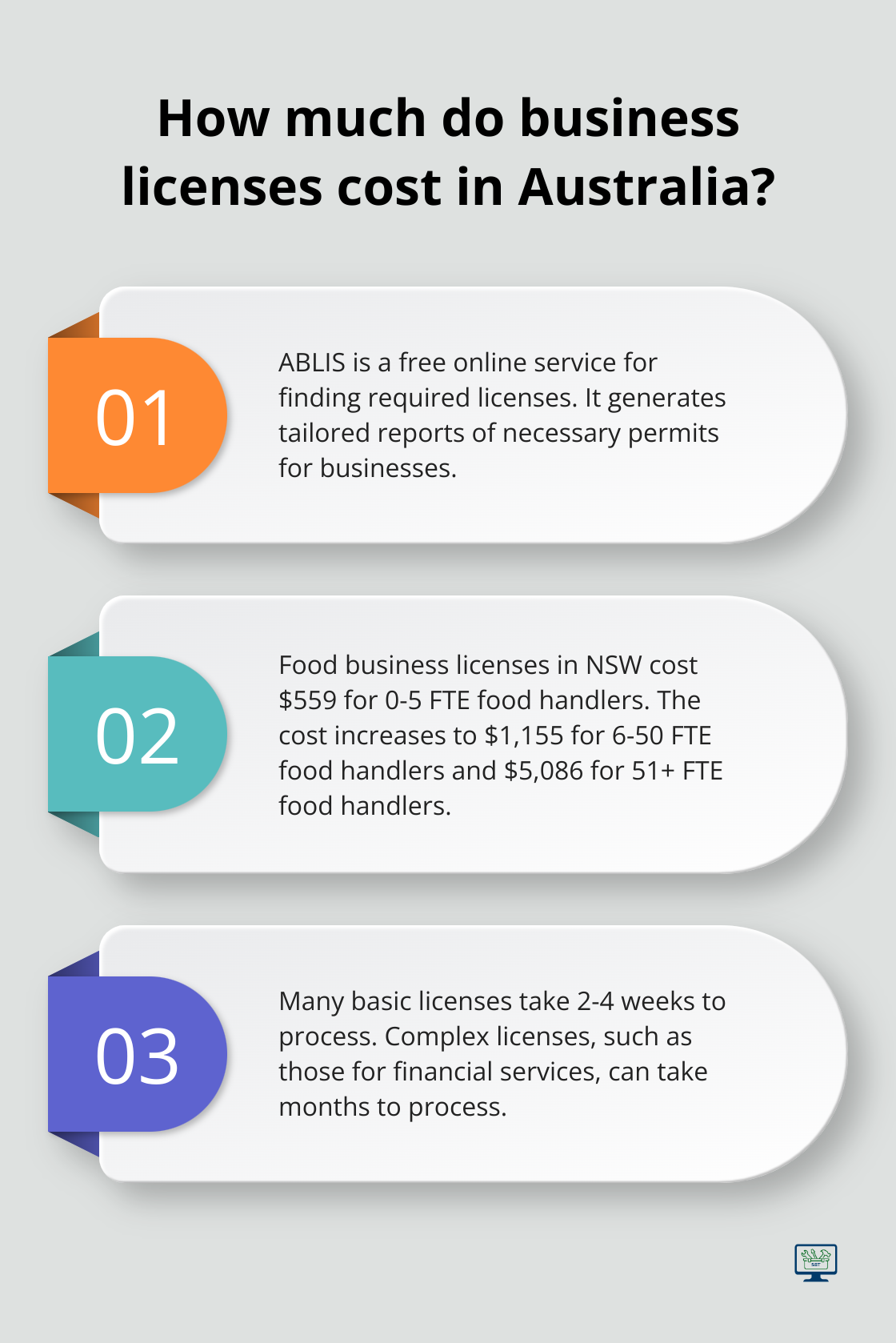
To use ABLIS effectively, collect information about your business operations beforehand. This includes details like your business structure, industry, and planned activities. The accuracy of your input directly affects the precision of your results.
Step-by-Step License Application Process
After identifying the necessary licenses, follow this process to apply:
- Prioritize your applications. Begin with federal requirements (such as your ABN), then progress to state and local licenses.
- Collect required documents. Common requirements include proof of identity, qualifications, and business plans.
- Submit applications. Apply for many licenses online, but prepare for potential in-person visits or mailed forms.
- Pay fees. License costs vary widely. A food business license in NSW costs $559 for businesses with 0-5 FTE food handlers, $1,155 for 6-50 FTE food handlers, and $5,086 for 51+ FTE food handlers, plus a $50 application fee. Liquor licenses can cost thousands of dollars.
- Allow for processing time. Timeframes differ, but many basic licenses take 2-4 weeks to process. Complex licenses (like those for financial services) can take months.
- Respond quickly to any requests for additional information to avoid delays.
Managing Renewals and Changes
Obtaining your initial licenses marks only the beginning. Many licenses require annual renewal, and failure to renew can result in penalties. Implement a system to track expiration dates and budget for renewal fees.
If your business operations change, you may need to update your licenses. For example, expanding your café to include alcohol sales requires applying for a liquor license.
Seeking Professional Assistance
For complex licensing situations, consider seeking help from a business consultant or lawyer. These professionals can navigate intricate regulations and potentially expedite the process. While this incurs additional costs, it can save time and prevent costly mistakes.
Final Thoughts
Navigating the world of business licences in Australia is a critical step for small business success. From the essential Australian Business Number to industry-specific licenses and local council permits, each document ensures legal and ethical operations. Compliance with licensing requirements builds trust with customers, partners, and regulatory bodies.
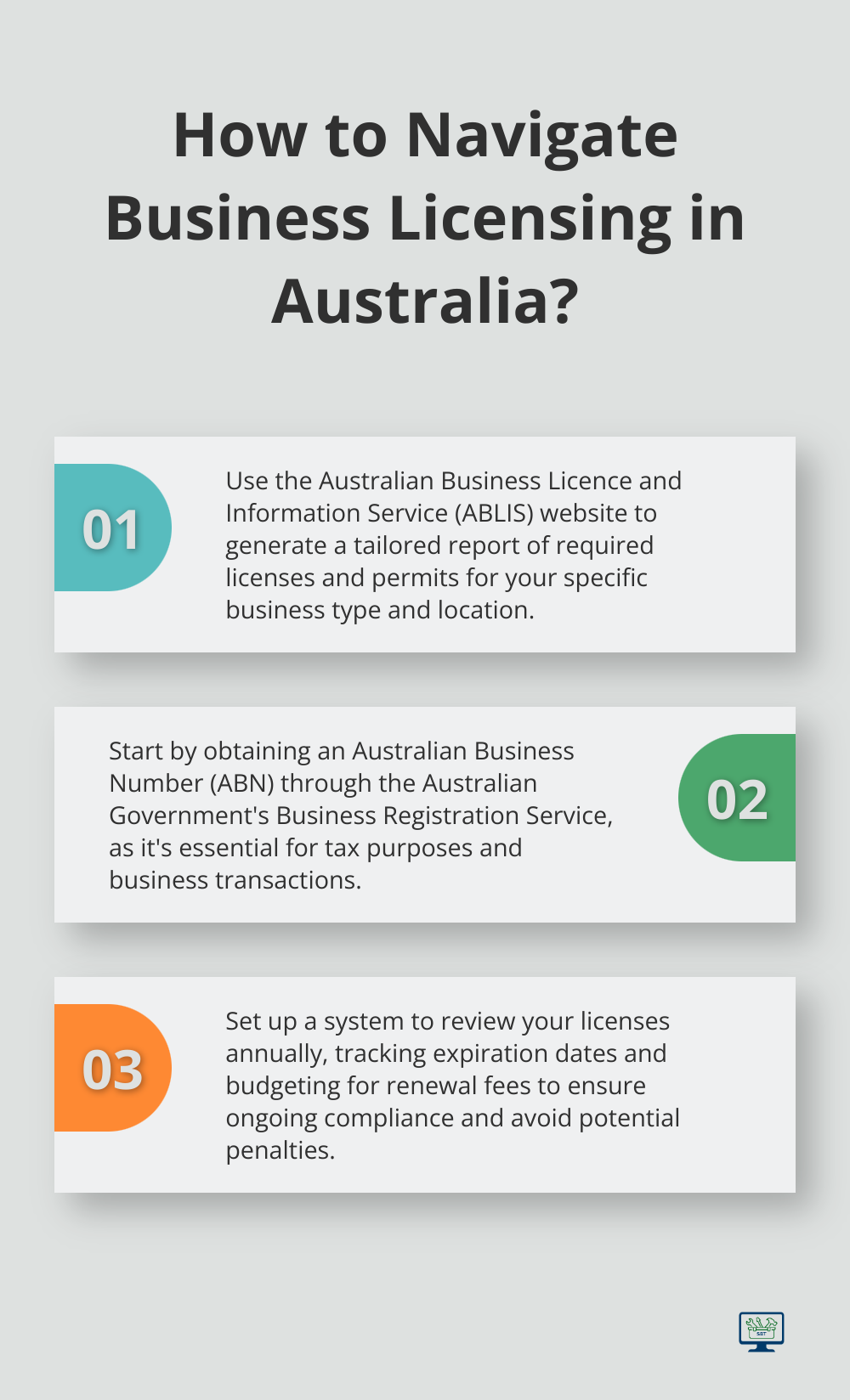
The licensing landscape can be complex and ever-changing. We recommend you use resources like the Australian Business Licence and Information Service to stay informed about your specific requirements. Don’t hesitate to seek professional advice when needed, especially for industry-specific or complex licensing situations.
At SmallBizToolbox, we understand the challenges small business owners face in managing these administrative tasks. We offer a comprehensive suite of tools and resources designed to streamline your business operations. Our platform provides AI-driven content creation, SEO optimization, and social media aids to boost your online presence.
How useful was this Resource?
Click on a star to rate it!
Average rating 0 / 5. Vote count: 0
No votes so far! Be the first to rate this post.
We are sorry that this post was not useful for you!
Let us improve this Resource!
Tell us how we can improve this Resource?



